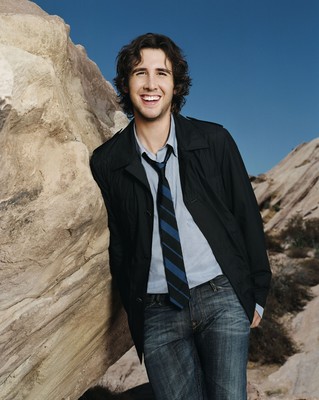Untethered

Josh Groban remembers that in one of the first interviews he did when he was all of 19, he said one of his dreams was to have a song scoring the Bellagio fountain show.
The fact that it hasn’t come true seven years later surely must be an oversight.
Groban packs arenas with folks heavily skewed to the older, upscale demographic that makes dollar signs light up in casino executives’ eyes. And he just turned 26, offering a long future for anyone who could sign him to a Celine Dion-type deal on the Strip.
Sheesh. A fountain show would seem to be one of the least embarrassing ways they could grovel.
“It’s something I’d be interested in, sure,” Groban says of a Barry Manilow- or Elton John-style presence on the Strip. He and his road musicians enjoy seeing a Las Vegas date at the end of a tour. “There’s no party like a Vegas party,” he says. “I love gambling, too. I’ll be at the blackjack table at 7 in the morning.”
But he wouldn’t sign up for any Celine-length residencies at this stage of his career. “I don’t really have a huge, huge reason to stay in one place for a large amount of time,” he says.
Groban isn’t ready to be pinned down at a musical level either. His light classical stylings are at the forefront of the “pop-era” boom, but the “Awake” album and supporting tour visiting the MGM Grand Garden on Saturday find him stretching his voice all the way to pop radio.
“It’s not about shocking my fans, not about saying, ‘This is me now,’ ” Groban says of an album that begins with him singing in Italian with an orchestra but ends in a club-worthy collaboration with Herbie Hancock. “It’s about gradually growing, surprising yourself and surprising your audience and kind of going on this journey together.”
Groban has the opposite challenge of pop or rock singers — Elvis Costello, Rod Stewart, etc. — who decide to tackle the standards or material that requires a formally trained voice. His poppier selections must be carefully chosen and put in a context where he doesn’t oversing them.
“It’s kind of constantly a battle between my voice and my head,” Groban says of his operatic baritone. “I wanted to stay true to my voice and what I do best, but at the same time not ignore kind of the nagging feelings I had in my heart to explore new sounds and songwriting with new producers.”
One solution has been to write or co-write his own songs. He and Dave Matthews teamed up for “Lullabye,” which was inspired by Groban’s visiting South Africa and later cutting two songs in New York with Ladysmith Black Mambazo, the vocal group best known for Paul Simon’s “Graceland” album.
“When I was in South Africa I became very inspired, both in a charitable sense — all of a sudden I felt like I’d found a direction for my foundation — and in a musical sense. I felt like I wanted to take from there a lot of that musical tapestry and explore it,” he says. “I felt that it actually would blend really well with the kind of classical style that I’ve been doing.”
Groban says that growing up with the “Graceland” album, he understands how his U.S. fans must feel when he sings in the romance languages. Fans “don’t necessarily understand every word that I’m singing. But they feel something. … I can’t understand Zulu but I understood the heart of what (Ladysmith Black Mambazo) were singing.”
“February Song,” which he co-wrote with Five for Fighting’s John Ondrasik, currently is working its way up adult contemporary charts. “If I can sit down at the piano and write a pop song and get it on the radio, and at the same time get the same person who is listening to that song to appreciate a song that’s more classical or in Italian, then for me that’s a job accomplished,” he says.
“It’s about opening people’s minds to new sounds. … It’s about saying, ‘I’m not OK with just showing you one-tenth of who I am.’ “